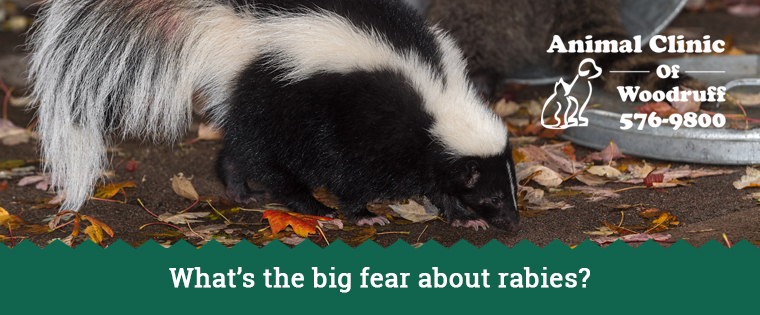You may have heard a news report recently about a rabid bat killing a person. Or the warning to avoid parts of Atlanta due to a rabid cat. It can sometimes feel like people are making a big deal over a weird, rare disease. Is rabies worth all this hype and concern?
Why is the fear of rabies so intense?
First, understand what rabies is. It’s a horrible viral infection that affects pets, wild animals and people. You can learn more about it in our rabies overview. People are understandably terrified of a disease that causes distressing neurological symptoms, and is fatal if not treated promptly.
Dogs and cats can get rabies from being bitten, licked or scratched by infected animals. Wild animals, including foxes, raccoons, skunks and bats that become infected with the disease, may wander into populated areas or approach pets they would normally avoid.
How can I protect myself and my pets from rabies?
First and foremost, your pets should be vaccinated every year for rabies. It’s not only healthy and smart, but it’s required by law. After a vaccination, add the updated rabies tag to your pets’ collars so that anyone encountering your pets immediately knows that they are safe.
Next, as mentioned earlier, keep your family and pets away from areas where rabid animals have been spotted. Local news sources and their affiliated social media sites will often report where suspected rabid animals are, and will update listeners on Animal Control’s status in trying to capture the animal. You do not want to risk the infected animal getting anywhere near your pets, your property, your family or yourself. Stay inside.
In general, try to avoid interactions with wild animals. While this is not always possible for hunters and their dogs, or those who live in rural areas, make an effort to keep your pets (and children) away from foxes, raccoons, skunks and other rodents. Curious dogs (and kids) may get too close to animals, and any wild animal bite will be suspected for rabies. If your pet is bitten by a wild animal, visit your veterinarian immediately. If a person in your family is bitten by a wild animal, visit the emergency room or urgent care immediately.
If you or a family member are bitten by a dog or cat, ask the owner to show proof of updated rabies vaccinations. If they don’t have proof and/or can’t obtain it from a veterinarian, you will most likely be advised by a doctor to start treatment for rabies.
Overall, treat rabies like the terrible, fatal disease that it is. Vaccinate your pets against it, and keep the paperwork. Visit your veterinarian if you at all suspect a dog or cat bite could be infected, and visit a doctor if you’ve been bitten by a wild animal. Don’t take chances – be proactive in preventing rabies.













